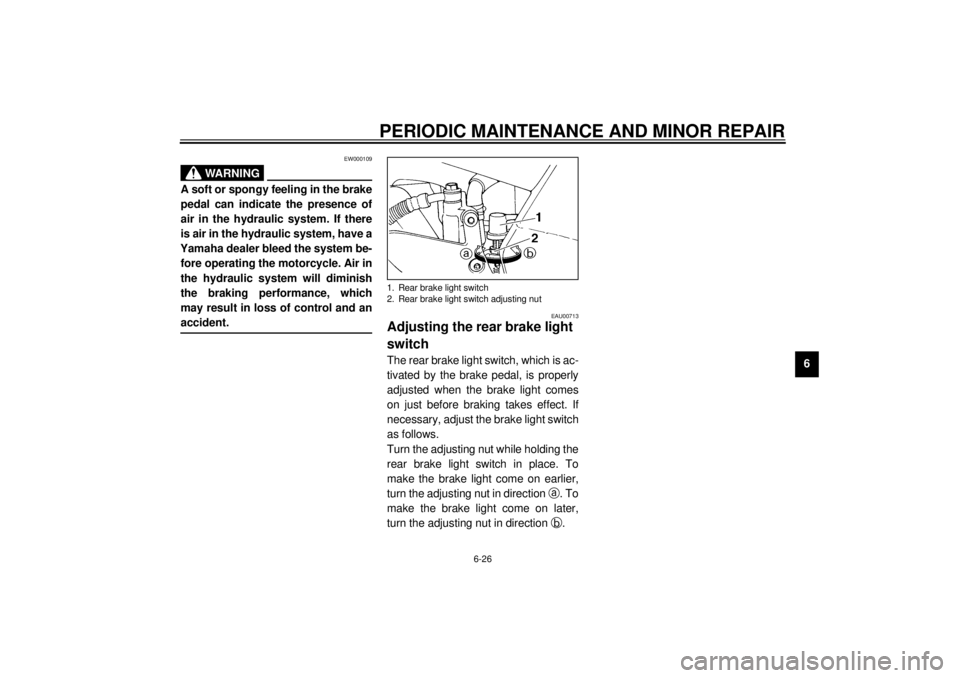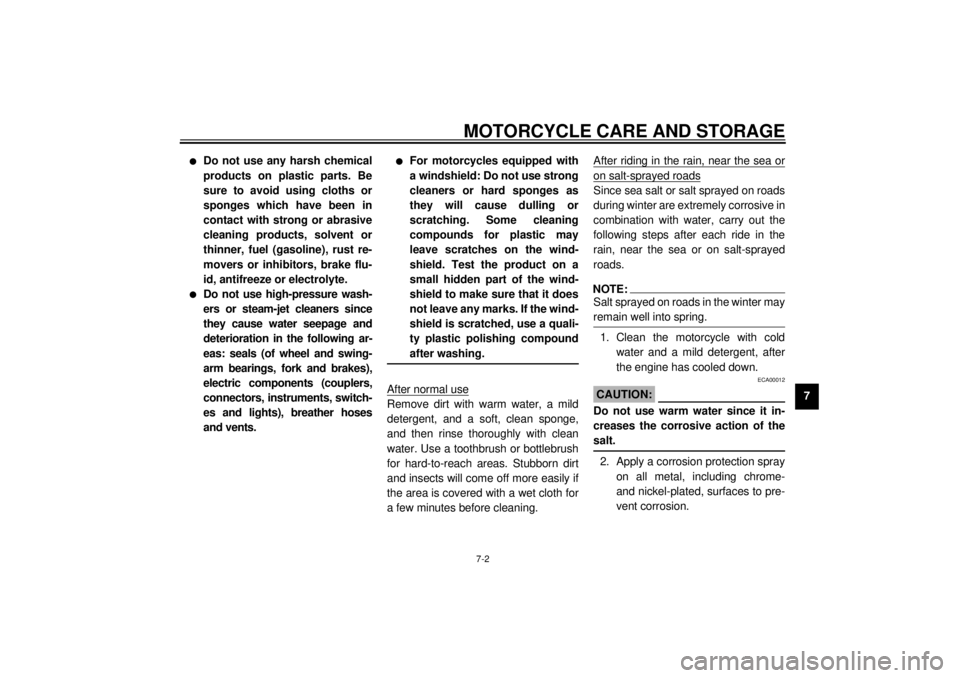2001 YAMAHA YZF600 brake light
[x] Cancel search: brake lightPage 15 of 114

3
INSTRUMENT AND CONTROL FUNCTIONS
Main switch/steering lock ..................................... 3-1
Indicator and warning lights ................................ 3-2
Speedometer unit ................................................ 3-3
Tachometer .......................................................... 3-4
Self-diagnosis device ........................................... 3-4
Anti-theft alarm (optional) .................................... 3-5
Coolant temperature gauge ................................. 3-5
Handlebar switches ............................................. 3-5
Clutch lever .......................................................... 3-7
Shift pedal ............................................................ 3-7
Brake lever ........................................................... 3-7
Brake pedal .......................................................... 3-8
Fuel tank cap ....................................................... 3-8Fuel ..................................................................... 3-9
Fuel tank breather hose (for Germany only) ....... 3-9
Starter (choke) lever........................................... 3-10
Seat ................................................................... 3-11
Helmet holder .................................................... 3-11
Storage compartment ....................................... 3-12
Adjusting the front fork ...................................... 3-12
Adjusting the shock absorber assembly ............ 3-14
Matching the front and rear suspension
settings ............................................................ 3-17
Luggage strap holders ...................................... 3-18
Sidestand .......................................................... 3-18
Ignition circuit cut-off system ............................. 3-19
E_4tv.book Page 1 Wednesday, October 4, 2000 2:15 PM
Page 39 of 114

PRE-OPERATION CHECKS
4-2
4
Throttle grip• Make sure that operation is smooth.
• Lubricate throttle grip, housing and cables if necessary.
• Check free play.
• If necessary, have Yamaha dealer make adjustment.6-20
Control cables• Make sure that operation is smooth.
• Lubricate if necessary.6-31
Drive chain• Check chain slack.
• Adjust if necessary.
• Check chain condition.
• Lubricate if necessary.6-29
Wheels and tires• Check for damage.
• Check tire condition and tread depth.
• Check air pressure.
• Correct if necessary.6-21–6-24
Brake and shift pedals• Make sure that operation is smooth.
• Lubricate pedal pivoting points if necessary.6-32
Brake and clutch levers• Make sure that operation is smooth.
• Lubricate lever pivoting points if necessary.6-32
Sidestand• Make sure that operation is smooth.
• Lubricate pivot if necessary.6-32
Chassis fasteners• Make sure that all nuts, bolts and screws are properly tightened.
• Tighten if necessary.—
Instruments, lights, signals
and switches• Check operation.
• Correct if necessary.—
Sidestand switch• Check operation of ignition circuit cut-off system.
• If system is defective, have Yamaha dealer check vehicle.3-18 ITEM CHECKS PAGE
E_4tv.book Page 2 Wednesday, October 4, 2000 2:15 PM
Page 49 of 114

6
PERIODIC MAINTENANCE AND MINOR REPAIR
Owner’s tool kit .................................................... 6-1
Periodic maintenance and lubrication chart ......... 6-2
Removing and installing cowlings ........................ 6-5
Checking the spark plugs .................................... 6-8
Engine oil and oil filter cartridge ........................ 6-10
Coolant .............................................................. 6-13
Cleaning the air filter element ............................ 6-17
Checking the air vent hose ................................ 6-18
Air intake duct .................................................... 6-19
Adjusting the carburetors ................................... 6-19
Adjusting the engine idling speed ...................... 6-19
Adjusting the throttle cable free play .................. 6-20
Adjusting the valve clearance ............................ 6-20
Tires ................................................................... 6-21
Cast wheels ....................................................... 6-24
Adjusting the clutch lever free play .................... 6-25
Adjusting the brake pedal position ..................... 6-25
Adjusting the rear brake light switch .................. 6-26
Checking the front and rear brake pads ............. 6-27
Checking the brake fluid level ............................ 6-27
Changing the brake fluid .................................... 6-28
Drive chain slack ................................................ 6-29
Lubricating the drive chain ................................. 6-30Checking and lubricating the cables ................. 6-31
Checking and lubricating the throttle grip and
cable ............................................................... 6-31
Checking and lubricating the brake and
shift pedals ...................................................... 6-32
Checking and lubricating the brake and
clutch levers .................................................... 6-32
Checking and lubricating the sidestand ............ 6-32
Lubricating the rear suspension ........................ 6-33
Checking the front fork ...................................... 6-33
Checking the steering ....................................... 6-34
Checking the wheel bearings ............................ 6-34
Battery ............................................................... 6-35
Replacing the fuses .......................................... 6-36
Replacing the headlight bulb ............................. 6-37
Replacing the tail/brake light bulb ..................... 6-38
Replacing a turn signal light bulb ...................... 6-39
Supporting the motorcycle ................................ 6-39
Front wheel ....................................................... 6-40
Rear wheel ........................................................ 6-41
Troubleshooting ................................................. 6-43
Troubleshooting charts ...................................... 6-44
E_4tv.book Page 1 Wednesday, October 4, 2000 2:15 PM
Page 53 of 114

PERIODIC MAINTENANCE AND MINOR REPAIR
6-4
6
EAU03541
NOTE:_l
The air filter needs more frequent service if you are riding in unusually wet or dusty areas.
l
Hydraulic brake service
• Regularly check and, if necessary, correct the brake fluid level.
• Every two years replace the internal components of the brake master cylinder and caliper, and change the brake fluid.
• Replace the brake hoses every four years and if cracked or damaged.
_22
*Carburetors• Check starter (choke) operation.
• Adjust engine idling speed and synchronization.ÖÖÖÖÖ Ö
23 Engine oil• Change.ÖÖÖÖÖ Ö
24 Engine oil filter cartridge• Replace.ÖÖÖ
25*Cooling system• Check coolant level and vehicle for coolant leakage.ÖÖÖÖ Ö
• Change. Every 3 years
26*Front and rear brake
switches• Check operation.ÖÖÖÖÖ Ö
27 Moving parts and cables• Lubricate.ÖÖÖÖ Ö
28*Lights, signals and
switches• Check operation.
• Adjust headlight beam.ÖÖÖÖÖ Ö NO. ITEM CHECK OR MAINTENANCE JOBODOMETER READING (´1,000 km)
ANNUAL
CHECK
1 10203040
E_4tv.book Page 4 Wednesday, October 4, 2000 2:15 PM
Page 75 of 114

PERIODIC MAINTENANCE AND MINOR REPAIR
6-26
6
EW000109
WARNING
_ A soft or spongy feeling in the brake
pedal can indicate the presence of
air in the hydraulic system. If there
is air in the hydraulic system, have a
Yamaha dealer bleed the system be-
fore operating the motorcycle. Air in
the hydraulic system will diminish
the braking performance, which
may result in loss of control and an
accident. _
EAU00713
Adjusting the rear brake light
switch The rear brake light switch, which is ac-
tivated by the brake pedal, is properly
adjusted when the brake light comes
on just before braking takes effect. If
necessary, adjust the brake light switch
as follows.
Turn the adjusting nut while holding the
rear brake light switch in place. To
make the brake light come on earlier,
turn the adjusting nut in direction
a. To
make the brake light come on later,
turn the adjusting nut in direction
b. 1. Rear brake light switch
2. Rear brake light switch adjusting nut
E_4tv.book Page 26 Wednesday, October 4, 2000 2:15 PM
Page 87 of 114

PERIODIC MAINTENANCE AND MINOR REPAIR
6-38
6
EW000119
WARNING
_ Headlight bulbs get very hot. There-
fore, keep flammable products away
from a lit headlight bulb, and do not
touch the bulb until it has cooled
down. _3. Place a new bulb into position, and
then secure it with the bulb holder.
EC000104
CAUTION:_ Take care not to damage the follow-
ing parts:l
Headlight bulb
Do not touch the glass part of
the headlight bulb to keep it free
from oil, otherwise the transpar-
ency of the glass, the luminosi-
ty of the bulb, and the bulb life
will be adversely affected. Thor-
oughly clean off any dirt and fin-
gerprints on the headlight bulb
using a cloth moistened with al-
cohol or thinner.
l
Headlight lens
• Do not affix any type of tinted
film or stickers to the head-
light lens.
• Do not use a headlight bulb of
a wattage higher than speci-
fied.
_4. Install the bulb cover, and then
connect the coupler.
5. Have a Yamaha dealer adjust the
headlight beam if necessary.
EAU01623
Replacing the tail/brake light
bulb 1. Remove the tail/brake light lens by
removing the screws.
2. Remove the defective bulb by
pushing it in and turning it counter-
clockwise.
3. Insert a new bulb into the socket,
push it in, and then turn it clock-
wise until it stops.
4. Install the lens by installing the
screws.
EC000108
CAUTION:_ Do not overtighten the screws, oth-
erwise the lens may break. _
1. Do not touch this area.
1. Screw (´ 2)
E_4tv.book Page 38 Wednesday, October 4, 2000 2:15 PM
Page 97 of 114

MOTORCYCLE CARE AND STORAGE
7-2
7
l
Do not use any harsh chemical
products on plastic parts. Be
sure to avoid using cloths or
sponges which have been in
contact with strong or abrasive
cleaning products, solvent or
thinner, fuel (gasoline), rust re-
movers or inhibitors, brake flu-
id, antifreeze or electrolyte.
l
Do not use high-pressure wash-
ers or steam-jet cleaners since
they cause water seepage and
deterioration in the following ar-
eas: seals (of wheel and swing-
arm bearings, fork and brakes),
electric components (couplers,
connectors, instruments, switch-
es and lights), breather hoses
and vents.
l
For motorcycles equipped with
a windshield: Do not use strong
cleaners or hard sponges as
they will cause dulling or
scratching. Some cleaning
compounds for plastic may
leave scratches on the wind-
shield. Test the product on a
small hidden part of the wind-
shield to make sure that it does
not leave any marks. If the wind-
shield is scratched, use a quali-
ty plastic polishing compound
after washing.
_After normal useRemove dirt with warm water, a mild
detergent, and a soft, clean sponge,
and then rinse thoroughly with clean
water. Use a toothbrush or bottlebrush
for hard-to-reach areas. Stubborn dirt
and insects will come off more easily if
the area is covered with a wet cloth for
a few minutes before cleaning.After riding in the rain, near the sea or
on salt-sprayed roadsSince sea salt or salt sprayed on roads
during winter are extremely corrosive in
combination with water, carry out the
following steps after each ride in the
rain, near the sea or on salt-sprayed
roads.NOTE:_ Salt sprayed on roads in the winter may
remain well into spring. _1. Clean the motorcycle with cold
water and a mild detergent, after
the engine has cooled down.
ECA00012
CAUTION:_ Do not use warm water since it in-
creases the corrosive action of the
salt. _2. Apply a corrosion protection spray
on all metal, including chrome-
and nickel-plated, surfaces to pre-
vent corrosion.
E_4tv.book Page 2 Wednesday, October 4, 2000 2:15 PM
Page 105 of 114

SPECIFICATIONS
8-4
8
Wheel travel
Front 130 mm
Rear 120 mm
Electrical system
Ignition system T.C.I. (digital)
Charging system
Type A.C. magneto
Standard output 14 V, 18.5 A @ 5,000 r/min
Battery
Model YTX12-BS
Voltage, capacity 12 V, 10 Ah
Headlight typeQuar tz bulb (halogen)
Bulb voltage, wattage ´ quantity
Headlight 12 V, 60/55 W ´ 1
Tail/brake light 12 V, 5/21 W ´ 1
Turn signal light 12 V, 21 W ´ 4
Auxiliary light 12 V, 4 W ´ 1
Meter lighting 12 V, 1.7 W ´ 4
Neutral indicator light 12 V, 3.4 W ´ 1
High beam indicator light 12 V, 3.4 W ´ 1
Oil level warning light 12 V, 3.4 W ´ 1
Turn signal indicator light 12 V, 3.4 W ´ 1
Fuel level warning light 12 V, 3.4 W ´ 1Fuses
Main fuse 30 A
Headlight fuse 20 A
Signaling system fuse 15 A
Radiator fan fuse 7.5 A
Ignition fuse 7.5 A
E_4tv.book Page 4 Wednesday, October 4, 2000 2:15 PM